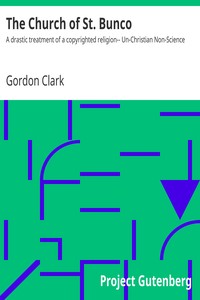The Church of St. Bunco : A drastic treatment of a copyrighted religion-- Un-…
"The Church of St. Bunco" by Gordon Clark is a critical examination of the foundations and claims of Christian Science, written in the early 20th century. This book serves as a satirical treatment of the religion founded by Mary Baker Eddy, presenting it as a deceptive system that capitalizes on sincere beliefs about the power of the mind over matter. Clark's work is positioned to challenge the legitimacy of Christian Science by
dissecting its historical origins and methodologies, particularly focusing on the contributions of Phineas Quimby. At the start of the text, Clark sets the stage by outlining the development of Christian Science in the context of late 19th and early 20th-century America, pointing out how it emerged amidst a backdrop of scientific thought and experimentation. He introduces the notion that while some tenets of the movement, such as mental healing, may resonate with genuine beliefs, the movement itself is fraught with false premises and a lack of empirical grounding. The opening chapters delve into the early life of Quimby, illustrating his influence on Eddy and how she appropriated his ideas to create her own religious framework—a framework that Clark argues is more focused on profit than genuine healing or spiritual truth. This critique sets the tone for a broader inquiry into the implications of faith-based healing and the ethical responsibilities of those who lead such movements. (This is an automatically generated summary.)
Read or download for free
| How to read | Url | Size | |||
|---|---|---|---|---|---|
| Read now! | https://www.gutenberg.org/ebooks/39895.html.images | 321 kB | |||
| EPUB3 (E-readers incl. Send-to-Kindle) | https://www.gutenberg.org/ebooks/39895.epub3.images | 199 kB | |||
| EPUB (older E-readers) | https://www.gutenberg.org/ebooks/39895.epub.images | 203 kB | |||
| EPUB (no images, older E-readers) | https://www.gutenberg.org/ebooks/39895.epub.noimages | 183 kB | |||
| Kindle | https://www.gutenberg.org/ebooks/39895.kf8.images | 384 kB | |||
| older Kindles | https://www.gutenberg.org/ebooks/39895.kindle.images | 340 kB | |||
| Plain Text UTF-8 | https://www.gutenberg.org/ebooks/39895.txt.utf-8 | 283 kB | |||
| Download HTML (zip) | https://www.gutenberg.org/cache/epub/39895/pg39895-h.zip | 193 kB | |||
| There may be more files related to this item. | |||||
Similar Books
About this eBook
| Author | Clark, Gordon |
|---|---|
| LoC No. | 02000750 |
| Title | The Church of St. Bunco : A drastic treatment of a copyrighted religion-- Un-Christian Non-Science |
| Credits |
Produced by Bryan Ness and the Online Distributed Proofreading Team at www.pgdp.net (This book was produced from scanned images of public domain material from the Google Print project.) |
| Reading Level | Reading ease score: 60.5 (8th & 9th grade). Neither easy nor difficult to read. |
| Language | English |
| LoC Class | BX: Philosophy, Psychology, Religion: Christianity: Churches, Church movements |
| Subject | Christian Science |
| Category | Text |
| EBook-No. | 39895 |
| Release Date | Jun 2, 2012 |
| Copyright Status | Public domain in the USA. |
| Downloads | 262 downloads in the last 30 days. |
| Project Gutenberg eBooks are always free! | |

